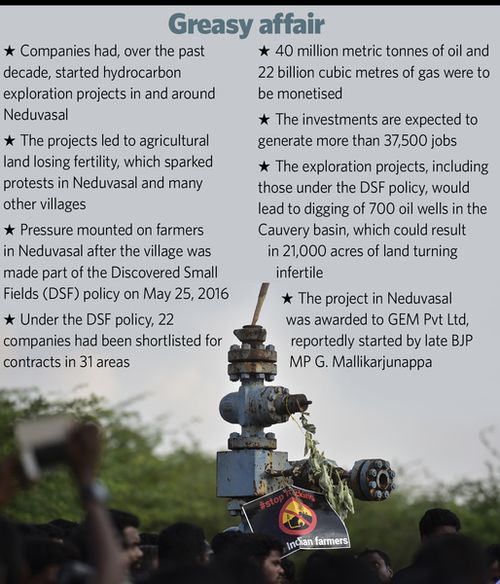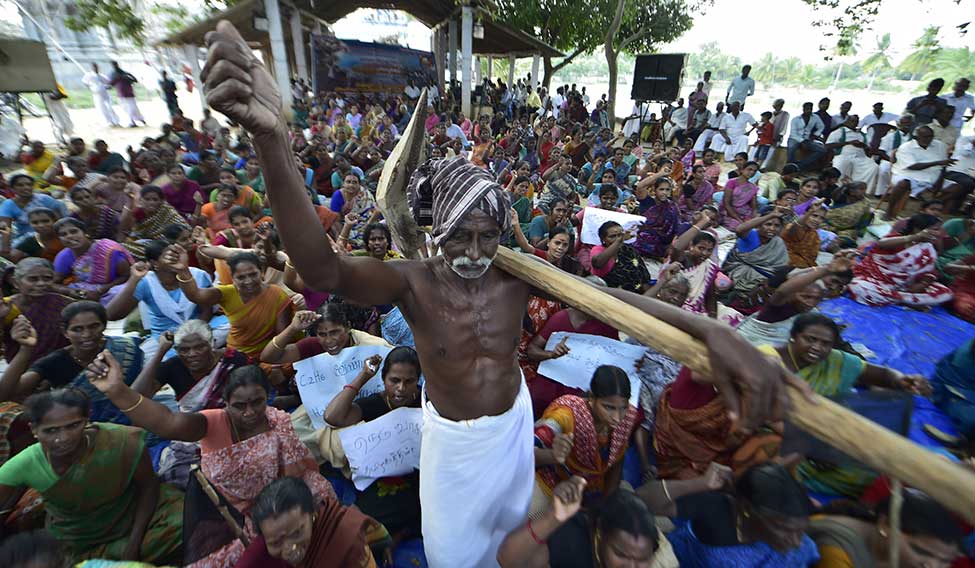The sun spat fire, creating a mirage on the state highway. The 40km stretch—from the drought-hit city of Pudukkottai to the nondescript village of Neduvasal—had parched fields on both sides. However, as we approached the village, at the tail end of the Cauvery basin, there was greenery in abundance. There was also dissent. Black flags fluttered on small houses and speakers blared warnings of reckless oil and gas exploration. The barbs were directed at the Union government. Men and women, young and old, raised their fists and shouted slogans. “This is our motherland,” said Selvamani Ramanathan, a 49-year-old farmer. “We will not allow it to get spoiled. We will fight till our last breath. Let Prime Minister Narendra Modi come and talk to us. We voted for him believing he would do good for us. But he is trying to usurp our livelihood.” The widowed mother owns four acres of cultivable land, in which she has grown about 400 eucalyptus trees, groundnuts and black gram.
Next to her sat Subramanian Govintha Thevar, who is considered a hero by his fellow villagers. He has been fighting Oil and Natural Gas Corporation for the past four years. It all began in 2013, when he saw four officials measuring his land. “I asked them who they were and what they wanted,” he said. “They did not tell me anything and left the place. But, a few months later, another team, accompanied by the village officer and two other state government officers, came to me, saying that an oil company wanted my land to extract kerosene [petroleum]. They asked me to give four acres of my land, gave me a paper and asked me to sign it and mention the survey numbers. I refused, saying this was the only livelihood for me and 10 others in my family.”
The company, however, persisted. Officials met him every three months, trying to convince him. He said they even tried to trick him, saying other farmers, who owned the surrounding land, had caved in. But Subramanian remained stubborn, even when he was called to the company’s branch office in Pudukottai and allegedly threatened. “They said the land will be given back to me after extraction, in three to four years,” he said. Last year, the company offered him Rs 85,000 per acre, annually. He declined, saying he had to repay a Rs 4 lakh loan he had taken for digging a borewell and a loan of Rs 4.5 lakh he had taken for the treatment of his wife’s breast cancer. On February 15, when he heard that the Centre had decided to go ahead with the extraction, he gathered some villagers and petitioned the collector. It soon became a massive protest.
A kilometre from Subramanian’s farm, in Nallandarkollai village, at least half of a nine-acre plot, owned by Kuzhandhai Velar, has become barren. A 15-foot pipe stood on the land, and black oil spillage surrounded it. A few meters away, a small tank was brimming with what seemed like crude oil. “We gave them six acres on lease in 2006,” said Kuzhandhai’s son, Karuppaiah. “My father signed it. We do not know the name of the oil company. We have been getting Rs 16,000 per acre every six months as per the lease. But, we did not get the last due. They left this place last year saying there is no kerosene here, promising to clear the debris. We are still waiting. They dug the land continuously, using huge machines, for at least six months before erecting that pipe. One part of our land was closed off with thorns.” Since then, they have been growing paddy on the remaining land. This year, said Karuppaiah, the yield was close to 54,000 kilos. “I sold one bag—60 kilos—for Rs 1,400 this January,” he said. “I feel if we hadn’t lent the six acres to them, the yield would have been three or four times more.”

The father-son duo now has no option but to wait. “It [the land] has become infertile,” said Rasaiah Ramasamy, who comes to protest daily in a shed next to the land. “See the debris and the oil. We can’t even smoke standing next to this tank. It will burn within seconds.”
Thousands of students and activists have joined the protests—in and around Neduvasal—and have been educating the farmers about the hazards of hydrocarbon extraction. “We work in the hot sun in the oil fields,” said Vinoth, who has a diploma in mechanical engineering and works for an oil company in Dubai. “Gulf countries can afford to do this because there are no agricultural fields. But, hydrocarbon extraction from our fields will only make these 80 villages a desert.” He had come home on a visit, but has decided to stay back until the government withdraws the project.
While independent companies had, in the past decade, started exploration projects in Neduvasal, the pressure on the farmers mounted after the village was made a part of the Central government’s Discovered Small Fields (DSF) policy (which allows companies to own an oilfield without discovering it). With India importing 80 per cent of its crude oil, Prime Minister Modi had launched the policy on May 25, 2016, with the aim of reducing oil imports by 10 per cent by 2022.
On February 15, the Directorate General of Hydrocarbons announced that 134 bids had been received for contracts in 34 areas throughout India, and that 22 companies had been shortlisted for contracts in 31 areas. Of these, 15 companies were new entrants in the sector.
“These blocks, being small, and discovery of hydrocarbon having been made, are relatively less risky, offering a great opportunity to new entrants in the upstream hydrocarbon sector, hitherto seen as the preserve of only large players,” it said. “It is expected that in-place locked hydrocarbons volume of 40 million metric tonnes of oil and 22 billion cubic metres of gas will be monetised over a period of 15 years. The production from these contract areas will supplement domestic production.”
It also said that “the estimated indicative gross revenue over economic life would be Rs 46,400 crore, of which royalty collection and the government’s revenue share is expected to be around Rs 5,000 crore and Rs 9,300 crore, respectively. The investments into the awarded blocks are expected to generate more than 37,500 jobs.” The Central government is anticipating the cumulative peak production from all awarded fields to be around 15,000 barrels of oil a day and two million metric standard cubic metres of gas per day. “The Neduvasal and Karaikal [Puducherry] projects are expected to generate gross revenue of Rs 300 crore, and state government will get Rs 40 crore as royalty,” said the petroleum ministry.
Sources in the DGH and ONGC said that the exploration projects, including those under the DSF policy, would lead to digging of at least 700 oil wells in the Cauvery basin in Tamil Nadu, because of which at least 14,000 acres of cultivable land will come under the project. G. Sundararajan of Poovulagin Nanbargal, an NGO that deals with environmental issues, said “at least 21,000 acres will turn infertile if this project is executed as per plans”.
“We are not against development, but agriculture is our livelihood,” said Malarmani Renganathan, 52. “If we have our fertile land, we can create jobs and earn more than Rs 40 crore.” She is one among many women in Neduvasal who turn up at the protest site every day after finishing their household duties. In fact, the women here seem more determined to derail the projects.
When awarding the contracts, neither the petroleum ministry nor the prime minister’s office would have imagined such staunch opposition from a small village in Tamil Nadu. Incidentally, the project in Neduvasal, which is in 10 square kilometres, was awarded to Gem Laboratories Private Limited, a company reportedly started by late BJP MP G. Mallikarjunappa.







